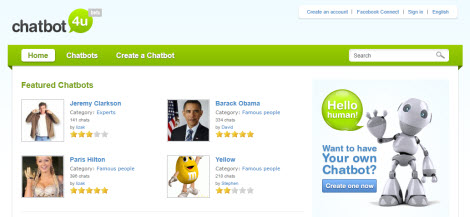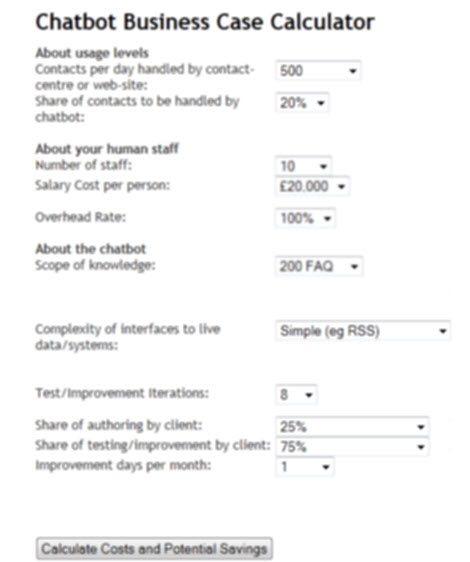
NEWS: Chatbots.org survey on 3000 US and UK consumers shows it is time for chatbot integration in customer service!read more..
Chatbots.org Business News
Robots may see, speak and feel. Now it’s time to play robotic football!
 | by Karolina Kuligowska on 14 years, 6 months ago in Agent's Processing, Cognition, Research News |
Summary: Robots trained by researchers from University of Edinburgh participate in Robot Soccer World Cup
Having acquired skills of falling in synthetic love, making long-term cyber relationships, and playing pool with two hands, it’s time to take care of the artificial stamina! Recently, robots became active supporters of football and they began to play this most famous game in the world.
Read more about: Robots may see, speak and feel. Now it’s time to play robotic football!
Chatbot4U Brings Chatbot Development to the Masses
 | by Sjoerd van Dijk on 14 years, 6 months ago in Applications, User Client Technology, Business News |
Summary: Innovative Online Service Lets Everyone Create Chatbots for Free, www.chatbot4u.com.
 Ecreation, an interactive media agency, introduced http://www.chatbot4u.com. By using this new service, now anyone can create a virtual chat partner, by following a few simple steps. These so-called chatbots can be used on websites, in social media and on instant messengers. Chatbot4U offers entertainment for consumers and interesting opportunities for businesses.
Ecreation, an interactive media agency, introduced http://www.chatbot4u.com. By using this new service, now anyone can create a virtual chat partner, by following a few simple steps. These so-called chatbots can be used on websites, in social media and on instant messengers. Chatbot4U offers entertainment for consumers and interesting opportunities for businesses.
Read more about: Chatbot4U Brings Chatbot Development to the Masses
Love + Robotics = LOVOTICS
 | by Karolina Kuligowska on 14 years, 6 months ago in Agent identity, Sensors, Human's perception of Agent, Emotion, Research News |
Summary: Are we going to fall in love with embodied agents? Multidisciplinary research in human-robot romantic love
How to model a human-to-robot romantic relationship? Just a few elements will do: artificial emotional hormones, intelligent affective system and probabilistic parameters of love between humans and the robot…
Chatbot Business Case Calculator to calculate potential savings
 | by Soulla Stylianou on 14 years, 7 months ago in Agent's perception of humans, Context, Business News |
Summary: Daden create chatbot business case calculator to help companies understand potential savings

An innovative business case calculator has been created by technology company Daden Limited to help organisations understand the potential savings that using an interactive virtual agent – or chatbot - can deliver.
Chatbots are computer applications that can act as a first line of support providing instant responses to questions, without the need for staff intervention, reducing pressure on resources. Available 24 hours a day, seven days a week they can also collect information, provide links to pages and answer queries using natural language conversation, whilst allowing human staff to focus on more complex queries.
Research has shown that the average cost-per-contact using a chatbot is under 60p, compared to over £3.50 for live text-chat or over £4 for a telephone contact – almost 84% reduction in costs. But clients often want to know what the actual benefits and savings would be for their own business.
Read more about: Chatbot Business Case Calculator to calculate potential savings
Need a buddy to play pool? Two-handed robot will do!
 | by Karolina Kuligowska on 14 years, 8 months ago in Agent's Processing, Cognition, Research News |
Summary: Robot participating in a pool play tournament is nothing strange nowadays. What about conversational agents?
During 2011 IEEE International Conference on Robotics and Automation researchers from Technical University of Munich presented a dual-armed robot capable of playing pool on a normal sized pool table.
Read more about: Need a buddy to play pool? Two-handed robot will do!
How many times has your chatbot been thanked?
 | by Soulla Stylianou on 14 years, 8 months ago in Business News |
Summary: #chatbots #daden How many times has your website been thanked?
Blog Post recalling a conversation that Daden’s own chatbot Abi had.
Read more about: How many times has your chatbot been thanked?
Can artificial limbs be controlled by mind-reading computers?
 | by Karolina Kuligowska on 14 years, 8 months ago in Agent's perception of humans, Neuroscience, Research News |
Summary: Neuro Breakthroughs: computers detect human thoughts
Researchers from Washington University School of Medicine in St. Louis have recently demonstrated that a computer can decode brain signals to infer the intentions of a human thoughts. From now on, people can “talk within their minds” to a computer in order to control it. How the act of human mind reading, usually associated with science-fiction literature, is actually possible?
Read more about: Can artificial limbs be controlled by mind-reading computers?
Google Talk Guru: Search embedded in IM chatbot
| by Jetty van Kooij on 14 years, 9 months ago in Agent identity, Personality, Applications, User Client Technology, Business News |
Summary: Google Labs has initiated a new project called Google Talk Guru, a so-called search engine chatbot.

Google Labs has initiated a new project called Google Talk Guru, a so-called search engine chatbot. It sounds promising; however at this stage you can only enquire about 7 topics:
Read more about: Google Talk Guru: Search embedded in IM chatbot
Virtual Agent integration in Facebook
 | by Ryan R on 14 years, 9 months ago in Applications, User Client Technology, Business News |
Summary: noHold Inc. Integrates a Virtual Agent within a Facebook Page

noHold, developer of the most interactive and diagnostic Virtual Agent technology, has the ability to embed a Virtual Agent directly into social media platforms, Facebook integration for ViewSonic serves as the first example.
As social media increasingly becomes a hub for customer interaction and support, noHold aims to help businesses cover these channels with Virtual Agent implementations. With a few simple lines of code, the same Virtual Agent that runs on a company website can assist end-users within their favorite mode of social media, such as Facebook. This provides end-users with an extra layer of interactivity and support, without the time needed to implement a second Virtual Agent.
Chatbots stimulate a positive ‘flow’ among their users
 | by Frans Plat on 14 years, 10 months ago in Human's perception of Agent, Emotion, Business News |
Summary: Research shows that chatbots stimulate a more positive state of mind and a more personal online experience.
 Research shows that chatbots stimulate a positive state of mind among their users. As a result users enjoy more pleasure in performing their activities and spend more time on performing them. According to ‘social response theory’, the ‘social cues’ send by chatbots increase the users’ involvement in interacting with a computer. As a consequence chatbots contribute to a more personal perception of the online experience.
Research shows that chatbots stimulate a positive state of mind among their users. As a result users enjoy more pleasure in performing their activities and spend more time on performing them. According to ‘social response theory’, the ‘social cues’ send by chatbots increase the users’ involvement in interacting with a computer. As a consequence chatbots contribute to a more personal perception of the online experience.
Read more about: Chatbots stimulate a positive ‘flow’ among their users
